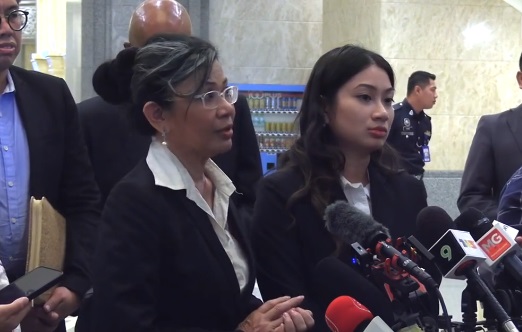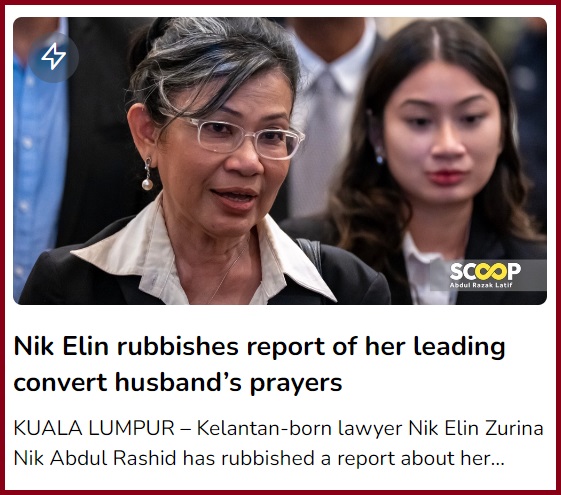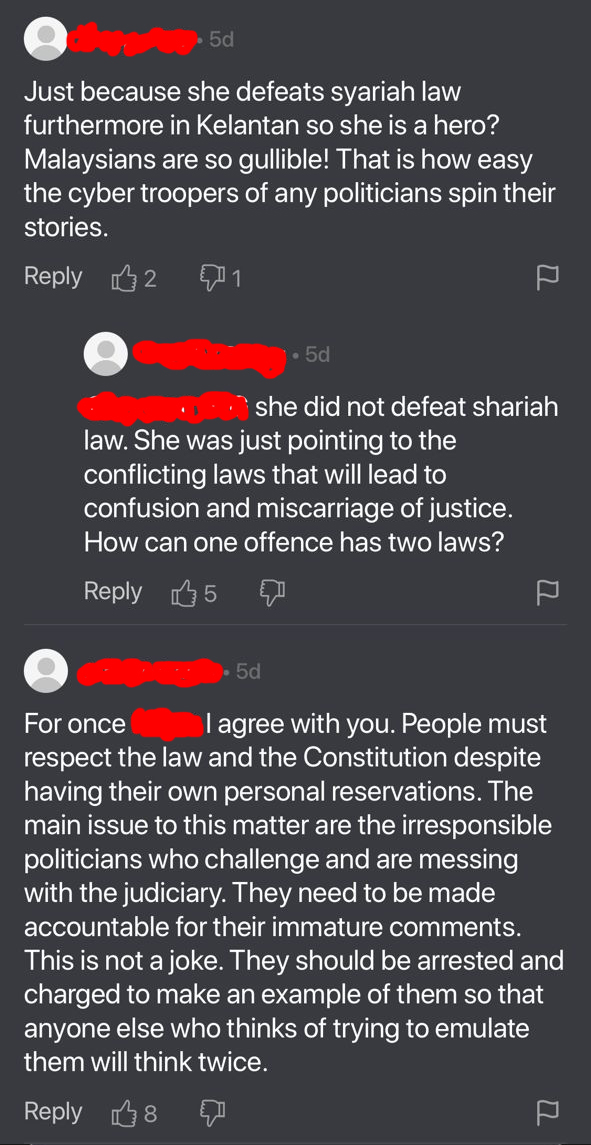Kelantan Syariah law case: 3 things Malaysians should be worried about

- 181Shares
- Facebook154
- Twitter4
- LinkedIn4
- Email4
- WhatsApp15
[This story was initially written in BM by our Soscili sisters. Read here]
Some of y’all may have heard about a recent case that supposedly threatened the syariah legal system in Malaysia.
If not, here’s the down low: Lawyer Nik Elin Zurina and her daughter Tengku Yasmin Natasha mounted a legal challenge to nullify 18 provisions under the Kelantan Syariah Criminal Code (1) Enactment 2019. The Federal Court essentially agreed with the petition and proceeded to invalidate 16 provisions. In other words, these 16 ‘laws’ have been removed from the syariah legal system.

Following that, there was a huge commotion, with many Muslims voicing their disapproval. To them, it seemed like a huge step back for Islam and the Islamic law in Malaysia. PAS Secretary-General, Takiyuddin Hassan, called it a ‘Black Friday‘ referring to the Friday that the Federal Court doled out their decision.
“This is no small matter. It is about upholding the syariah, and the Malay rulers as the head of Islam in states, the Yang di-Pertuan Agong as the head of Islam in the Federal Territories and other states without a sultan. So, we are defending the syariah, and the Malay rulers’ institution,” –Takiyuddin Hassan via Malaysiakini
Just hearing the names of sultans and the YDP Agong thrown in there, you’d think think the very sovereinty of Malaysia is being challenged. But the more concerning part is how did this situation get so out of hand? It’s even come to the point that Nik Elin has received death threats, and the Home Ministry is having to monitor public reaction.
Well, based on what we’ve gathered, there are three reasons why things turned out like this.
Reason #1: The public has no clue whatsoever how the law works.
To be really frank, even our heads were spinning when we first heard about this case. Cos from the headlines, it sounded like ‘Islamic law is under attack‘. But after delving deeper and looking into the syariah system in Malaysia, we figured this is actually a case of ‘state governments creating laws beyond their jurisdiction‘.

First things first, there are two legal systems in Malaysia: civil and syariah. Civil laws apply to all in Malaysia, while the syariah ones only apply to Muslims and take note that it differs from state to state. Civil laws are legislated by the Parliament, and Syariah laws are legislated by state governments.
Since we have two sets of laws, to prevent any overlap, it was decided that syariah laws would only apply to matters concerning Islamic customs and practices at the state level. For instance, burning a building wouldn’t fall under syariah, but if the building burned is a mosque, then it would come under syariah because it’s related to Islam.

So the provisions that were invalidated were done so because they were outside the jurisdiction of the syariah courts. That’s it. It doesn’t mean they’re totally gone, because they’re still offenses under the civil law.
It would also be inaccurate to say that this case is ‘going against God’s law’, because under Islamic jurisprudence, there are three types of offenses: hudud, qisas, and takzir. In short,
- Hudud: Breaking Allah’s law, punishments are in the Quran and Hadith.
- Qisas: Offenses against other people, punishments are also in the Quran and Hadith, like retaliation (an eye for an eye) or compensation.
- Takzir: Offenses are mentioned but punishments aren’t specified, so it’s left to the authorities to decide.
Malaysia’s syariah law currently uses takzir (punishments decided by state governments), which technically isn’t far off from civil law (punishments decided by Parliament). So, it’s not a matter of disrespecting God’s law if these offenses fall under civil law rather than Syariah.

So what’s with all the commotion then? Why are so many people misunderstanding the issue? Maybe it’s because this kind of info isn’t taught in schools. Or maybe most people just skim the headlines, which are sensationalized for a reason. Or perhaps there’s this notion that whatever news out there isn’t to be trusted due to a liberal agenda aiming to mislead and undermine Islam’s position in Malaysia.
Which brings us to the second reason…
Reason #2: There’s a distinct fear towards liberal stuff in Malaysia.
To put it simply, what got folks riled up was the mention of ‘syariah’, which basically made everyone see this case through a religious lens. And it certainly didn’t help when Nik Elin and Tengku Natasha were accused of being a bunch of liberals. Nah, see for yourselves:

Don’t wear tudung! You know what that means — liberal!!!


Not wearing a hijab is one thing, but there were a couple of people who dug up every little thing they could find, twisting stories left, right, and center to paint these two women as absolute liberals. For instance, some claim that Nik Elin leads her husband in prayer and others brought up a statement she made a whole 7 years ago about wearing the hijab.

What does this have to do with the Kelantan enactment case? Honestly, nothing at all. But now that Nik Elin and Tengku Natasha are perceived as a couple of shameless liberals in the public eye, this whole thing has suddenly morphed into ‘liberals threatening Islam’s position‘.
It may seem ludicrous to some and justified to others. Whatever the case, there is concern that Islam’s position in Malaysia is being eroded by certain liberal and secular groups, and this sentiment is clearly reflected in the statement made by Siti Zailah Mohd Yusoff, Leader of the PAS Women’s Wing Kelantan:
“What we’re worried about because of this ruling is not just the impact on Kelantan’s laws, but also the potential challenge to Islamic laws in other states. With Kelantan as a precedent, they might become bolder, and these liberal groups could gain momentum as if they have the upper hand,”–Siti Zailah, via Harakah Daily
Would things have been different if Nik Elin and Tengku Natasha wore full hijabs and were more careful with reporters? Maybe not, because it’s no coincidence that this has suddenly become a clash between Islam and liberalism.
Reason #3: Politicians are supposed to understand the law, but they’re acting like they don’t.
In addition to the “Black Friday” statement from Takiyuddin at the beginning of the article – which we now know to be super inaccurate – many similar statements were made by politicians in the past week.
Bersatu President, Muhyiddin Yassin, claimed that this case will have negative repercussions on the Syariah legal system not just in Kelantan but throughout the country. According to him,
“With this decision, actions that are contrary to Islamic law such as offering or partaking in vice services, incest, and drinking alcohol are no longer considered offenses for Muslims in the state of Kelantan.”–Muhyiddin Yassin, on his Facebook.

PAS President Abdul Hadi Awang also had a couple of things to say. Although he didn’t specify what exactly he meant, he mentioned that colonial laws are still in place despite our independence. Among other things, he urged Muslims to resist efforts that are ‘oppressive and misleading’ from the true teachings of Islam.
“This is because the sin of insulting Islam is bigger than the sin of insulting the courts, which is minute before God,”–Abdul Hadi Awang, via Malaysiakini.
Shortly after the court’s decision, Hamzah Zainuddin revealed his intention to meet with both the YDPA and Sultan of Selangor to present a special memorandum on the issue. His primary concern was that this move could potentially challenge the syariah criminal enactments in all states, putting them at risk of being nullified.
“At first glance, this decision may have a significant impact on diminishing the power and jurisdiction of the Malay rulers. Yet, the Malay rulers, along with the Yang di-Pertuan Agong, when swearing their oath of office under Article 37(1), vowed to uphold Islam at all times,”–Hamzah Zainuddin, via Harian Metro

And we mustn’t overlook Wan Ahmad Fayshal, who, for some reason, linked this issue to the Natrah Riot. Notice how he uses emotionally charged terms like fitnah (defamation), sekular (secular), liberal, musibah (catastrophe), dicabar (challenge), bahaya (danger), menghakis kedaulatan (undermining sovereignty). And how he mixes it with historical references and unrelated jargon such as Natrah and Mustafa Kamal Ataturk, all to add weight to his argument.

Members of Parliament should know better about the law since it’s their job to create and debate laws. So why are they making these statements now and not when the case first came up?
Perhaps some of them genuinely don’t grasp the issue, which is worrying given that MPs continue to reap their salaries. Or more likely, they’re intentionally making such statements for their own interests, as this isn’t the first time an issue like this has come up.
This leads us to what we should be most concerned about…
Times may change, but people are still played by the same political tactics.
The manipulation of religious and ethnic sentiments should be outdated by now, yet we still witness it today. These issues have been exploited by politicians since even before independence, if only because this tactic is easy, effective, and can be recycled with just a change of characters.

It’s the same old formula:
- Link an issue to religion/race (like the economic gap between races, or canceling Syariah laws)
- Find a scapegoat (like blaming other races or liberal groups)
- Stoke the flames (THEY’RE GETTING BOLDER!!!)
- Show up as the hero for religion/nation and get the majority on your side
This time, many netizens are seeing through the smoke and mirrors and trying to set the record straight. But we’ve still got a ways to go before we can leave these tired old issues behind and focus on what really matters.

As long as people can’t think for themselves and keep depending on politicians, those politicians will keep exploiting the people’s laziness.
- 181Shares
- Facebook154
- Twitter4
- LinkedIn4
- Email4
- WhatsApp15



